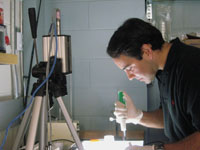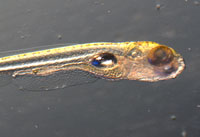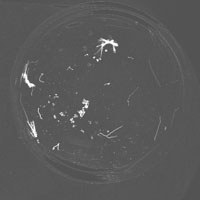 |
 |
|
 |
 |
 |
 |
 |
|
 |
 |
 |
 |
September 17, 2008
Do Early-Life Seizures Have Lasting Effects?
Grass Fellow Joaquin Lugo Uses Zebrafish to Study Epilepsy
By Joseph Caputo
|
 |
PHOTOS: Click on thumbnails for larger images.
|
 |
Grass Fellow Joaquin Lugo administers PTZ to zebrafish to measure the effects of seizures on development. (Credit: Joseph Caputo/MBL)
|
 |
Zebrafish, like many other members of the animal kingdom, can show signs of epilepsy.
|
 |
Lugo measures the movement of zebrafish to see whether or not they can catch paramecium days after a seizure.
|
MBL, WOODS HOLE, MA—Parents often use the word “helpless” to describe how they feel as they watch their infant show the first signs of status epilepticus, a temporary form of epilepsy. This life-threatening brain condition is signaled by a continuous jerking movement that lasts a half hour or longer and is one of the most common reasons for transport to a hospital’s pediatric intensive care unit. Half of the total cases occur in children less than 2 years old. With medication, many children survive the seizures and return home without further incident. However, whether the condition leaves a permanent neurological scar is unknown.
WATCH THE VIDEO
(wmv format) |
| After PTZ exposure, a zebrafish jerks around, a sign it is having a seizure. |
To find out if status epilepticus has long-term effects, scientists are turning to animal models. Epilepsy is not unheard of in other organisms. Dogs, cats, mice, and even zebrafish have been documented to have seizures. The symptoms are also recognizable across species. For instance, as a zebrafish begins to seize, it jerks wildly, circling around its tank until coming to a dramatic stop. It then lies still for a few moments and with a twitch, continues its erratic movement.
Joaquin Lugo, a postdoctoral researcher at Baylor College of Medicine, is at the Marine Biological Laboratory (MBL) this summer to study whether seizures during early zebrafish development have long-term neurological consequences. To do this, Lugo measures how a seizure during the first few days of a fish’s life affects its ability to capture prey several days later. Although the exact mechanisms are unknown, previous studies show that seizures affect the zebrafish tectum, the part of its brain associated with visual response. Lugo hypothesizes that if a fish has trouble grabbing its dinner, then brain damage could be an immediate after-effect of a seizure. If so, he will follow up with an anatomical investigation. Lugo is at the MBL on a Grass Fellowship, awarded to young scientists to conduct experimental research in neuroscience.
“The whole idea is to look at the effects of seizures very early on in life and how soon they occur,” Lugo says.
Standing over his section of the Grass Laboratory, Lugo begins his daily regimen of experiments by injecting pentylenetetrazole (PTZ), a seizure-inducing chemical, into a small compartment holding a young zebrafish. At this stage, the fish is just large enough to make out with the naked eye. After the fish recovers, Lugo drops paramecium into the fish’s compartment and records its movement as well as how many it is able to eat. Preliminary results show that the longer the seizure, the less likely a zebrafish will be able to catch its prey, although much more work needs to be done before any conclusions can be reached.
“If a lot is known about a particular behavior, such as visual response, then you can step back and ask how a seizure is disturbing that behavior,” Lugo says.
One question Lugo faces is whether seizures in zebrafish are equivalent to seizures in humans. Although the creature is earning a reputation as a model organism for epilepsy, along with tadpoles, not much is known about the condition in the fish. Lugo and other researchers are taking a chance on the animal in hopes of big medical payoffs. If they can understand how seizures affect an animal’s neurology, one day treatments may be developed to minimize the long-term effects of status epilepticus, creating one less unknown for concerned parents.
|
| |

 |
|
 |
 |
|